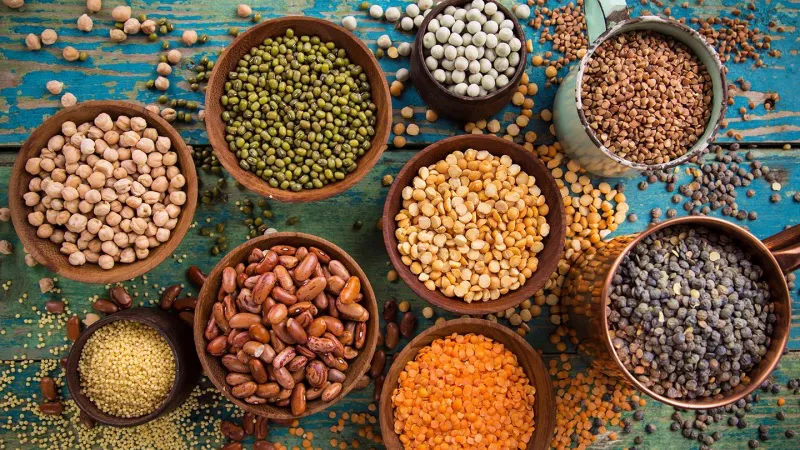Protein is an essential nutrient for human health, playing a crucial role in various bodily functions. While many individuals turn to animal sources to meet their protein needs, there is a growing awareness of the benefits of plant-based protein. Among the various plant-based protein sources, beans stand out as a remarkable option. In this article, we will delve deep into the world of high-protein beans, exploring their nutritional value, versatility in cooking, and their potential impact on your health. Join us on this protein-packed journey as we uncover the secrets of beans and their role in a protein-rich diet.
The Protein Powerhouse: Beans Unveiled
Beans are nature’s gift to those seeking a rich and sustainable source of protein. These humble legumes pack a powerful protein punch, making them a valuable addition to any diet. Protein, the cornerstone of muscle development and repair, is abundant in various types of beans, making them a favored choice for vegetarians, vegans, and anyone looking to diversify their protein sources.
Navigating the Bean Landscape: A Protein-Rich Variety
When it comes to beans, variety is the spice of life. There is an array of bean varieties, each offering its unique blend of flavors, textures, and, of course, protein content. Let’s explore some of the high-protein bean varieties that can elevate your protein intake.
Lima Beans: The Creamy Protein Source
Lima beans, also known as butter beans, are a protein-rich legume that boasts a creamy texture and a subtly nutty flavor. These beans are a great source of plant-based protein, making them an excellent choice for those looking to incorporate more protein into their diet. One cup of cooked lima beans contains approximately 15 grams of protein.
Black Beans: Protein in the Shadows
Black beans are a popular choice in many cuisines, known for their rich, earthy flavor and versatility in recipes. They are a protein powerhouse, containing around 15 grams of protein per cup when cooked. These beans are not only protein-rich but also high in fiber, making them a nutritional double threat.
Chickpeas: The Versatile Protein Hero
Chickpeas, also known as garbanzo beans, are a staple in Mediterranean and Middle Eastern cuisine. They are incredibly versatile and can be used in a wide range of dishes, from hummus to salads to curries. A one-cup serving of cooked chickpeas provides approximately 15 grams of protein, making them an ideal addition to your protein arsenal.
Kidney Beans: Robust and Protein-Packed
Kidney beans are named after their distinct kidney-like shape and are a favorite in chili recipes. These beans contain about 15 grams of protein per cooked cup, making them a reliable source of plant-based protein. Additionally, they are rich in fiber and various essential nutrients, making them a well-rounded choice.
Soybeans: The Protein Superstar
Soybeans are renowned for their exceptional protein content, earning them a spot as one of the most protein-rich beans. They contain an impressive 28 grams of protein per cup when cooked. Soybeans are incredibly versatile and can be used to make tofu, soy milk, and various other soy-based products that are popular among vegetarians and vegans.
Protein Power Beyond the Numbers
While it’s essential to understand the protein content of beans, it’s equally important to recognize the broader nutritional benefits they offer. Beans are not only high in protein but also provide an array of essential vitamins, minerals, and dietary fiber. This combination of nutrients makes beans a valuable addition to a balanced diet.
Fiber and Protein: A Winning Combination
Protein and fiber are a dynamic duo when it comes to promoting satiety and overall health. Beans, being rich in both protein and dietary fiber, can help you feel full and satisfied for longer periods. This can be particularly advantageous for those looking to manage their weight or control their appetite.
Micronutrients Matter
Beans are not just about protein; they also offer an impressive array of micronutrients. These include essential vitamins and minerals like folate, potassium, iron, and magnesium. Incorporating beans into your diet can contribute to meeting your daily requirements for these vital nutrients.
Heart Health and Protein
The protein found in beans has been linked to various heart-healthy benefits. Research suggests that diets rich in plant-based proteins, such as those found in beans, may help lower the risk of heart disease. Beans, with their high protein content, are a natural choice for individuals aiming to improve their cardiovascular health.
Protein and Weight Management
Protein plays a critical role in weight management. It helps preserve lean muscle mass while promoting fat loss, making it an invaluable nutrient for those on weight loss journeys. Beans provide a plant-based protein source that can aid in achieving and maintaining a healthy weight.
Digestive Health and Protein
The dietary fiber in beans not only supports digestive health but also enhances the utilization of protein in the body. Fiber aids in the absorption of nutrients, including protein, ensuring that your body can make the most of the protein you consume.
Protein Allergies and Sensitivities
Protein allergies or sensitivities can pose challenges when it comes to obtaining adequate protein from traditional sources like meat and dairy. Beans offer a valuable alternative for individuals with protein-related dietary restrictions. They are naturally free of common allergens like gluten and lactose, making them a safe option for many.
Cooking with High-Protein Beans
One of the significant advantages of beans is their versatility in the kitchen. From soups to salads, from dips to main courses, beans can be incorporated into a wide range of dishes. Here are some creative and delicious ways to include high-protein beans in your meals:
Bean Soups and Stews
Protein-packed bean soups and stews are not only hearty and comforting but also incredibly nutritious. You can use a variety of beans, such as black beans, kidney beans, or white beans, to create a delicious and filling soup. Pair them with vegetables, herbs, and spices for added flavor.
Bean Salads
Bean salads are a refreshing and protein-rich option for warm-weather meals. Combine beans with colorful vegetables, fresh herbs, and a zesty vinaigrette to create a satisfying salad. Consider using chickpeas, black-eyed peas, or a medley of different beans for variety.
Hummus and Bean Dips
Hummus, a creamy dip made from chickpeas, is a beloved snack around the world. You can also experiment with other bean varieties, such as white beans or black beans, to create unique and protein-packed dips. Serve them with whole-grain crackers or fresh vegetables for a wholesome snack.
Bean Burgers and Patties
Bean-based burgers and patties are a popular choice for those looking to reduce their meat consumption. They are easy to make and can be customized with various seasonings and toppings. Black bean burgers and chickpea patties are among the favorites.
Bean Curries and Stir-Fries
Beans can add a hearty and protein-rich element to your favorite curry or stir-fry. Use kidney beans, black beans, or chickpeas in your dishes for a plant-based protein boost. Combine them with aromatic spices and vegetables for a flavorful meal.
Bean Breakfasts
Start your day with a protein-packed breakfast by incorporating beans into your morning meal. Consider adding black beans to a breakfast burrito, chickpea flour to make savory pancakes, or white beans to a breakfast hash. These options will keep you energized throughout the day.
Incorporating Beans into a High-Protein Diet
Now that we’ve explored the protein content and culinary versatility of beans, let’s discuss practical strategies for incorporating these nutrient-dense legumes into a high-protein diet.
1. Meal Planning
Planning your meals is essential when aiming to increase your protein intake with beans. Consider incorporating beans into your weekly meal plan, ensuring that you have a variety of bean-based dishes to enjoy throughout the week.
2. Protein-Packed Snacks
Beans can also be included in your snack repertoire. Roasted chickpeas or edamame make excellent protein-rich snacks that can help curb your hunger between meals.
3. Balanced Combinations
Pairing beans with complementary foods can enhance the quality of protein in your diet. For example, combining beans with whole grains, such as brown rice or quinoa, creates a complete protein source that provides all essential amino acids.
4. Explore Global Cuisines
Exploring international cuisines can introduce you to new and exciting ways to prepare beans. From Indian dal to Mexican refried beans, different cultures have perfected the art of cooking beans.
5. Experiment with Recipes
Don’t be afraid to experiment with recipes and adapt them to suit your taste preferences. Whether you enjoy your beans spicy, creamy, or mild, there are countless recipes to explore.
6. Bean-Based Desserts
Yes, beans can even find their way into desserts! Black bean brownies, chickpea chocolate chip cookies, and white bean blondies are creative and delicious ways to satisfy your sweet tooth while boosting your protein intake.
7. Consider Canned and Dried Beans
Both canned and dried beans have their advantages. Canned beans are convenient and require less preparation time, while dried beans are more cost-effective and allow you to control the ingredients fully. Choose the option that suits your needs.
Protein Beyond the Plate: Bean Sustainability
When discussing beans and their protein content, it’s also crucial to consider their environmental impact. Beans are not only nutritious but also environmentally friendly. They have a lower carbon footprint compared to many animal protein sources and require less water and land to produce. By choosing beans as a primary protein source, you can contribute to a more sustainable food system.
Conclusion
In the quest for protein-rich foods, beans emerge as a true ally. Their high protein content, coupled with a wealth of other nutrients, makes them a valuable addition to any diet. Whether you are a vegetarian, vegan, or simply looking to diversify your protein sources, beans offer a versatile and delicious solution. From soups to salads, beans can be transformed into a wide range of dishes that cater to various tastes and preferences. Additionally, their sustainability and potential health benefits make them a win-win choice for both individuals and the planet.
[inline_related_posts title=”You Might Be Interested In” title_align=”left” style=”list” number=”6″ align=”none” ids=”2571,2503,2664″ by=”categories” orderby=”rand” order=”DESC” hide_thumb=”no” thumb_right=”no” views=”no” date=”yes” grid_columns=”2″ post_type=”” tax=””]



































